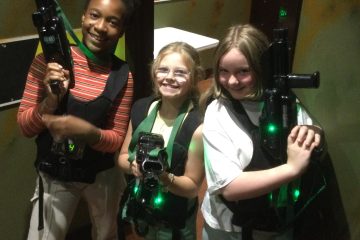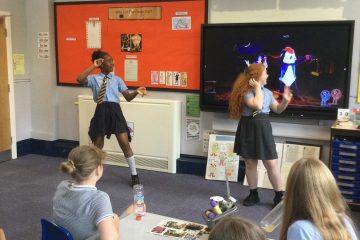- Have a plan. Knowing what you are going to do each day is far easier than trying to decide as you go along. Create a timetable, get your child to help with this. Complete more formal work in the morning with your child and more project/interest-based work in the afternoon. Your child’s class teacher has uploaded work onto the class blog for your child to do daily and you can use that as a basis for your day. The Class Blog can be found on Harwood Park Primary Website under Children, Class Pages and then School Blog.
- Free printable timetables can be found here.
- Don’t sit your child at a desk at 9am and keep them there until 3pm. We wouldn’t do that in schools and we wouldn’t do that to adults. Have regular movement breaks and split the day into manageable chunks. Depending on the age of your child activities might be done in short blasts.
- Try not to worry about your child falling behind, they will be fine. Proportionally this is a small chunk of time. Don’t dismiss their feelings, listen to worries, explain, empathise and give reassurance. Seek advice from online resources for this (see below).
- Don’t stress too much about screens. If they do end up spending a little longer on a screen or you use screen time to break up the day’s activities then that’s going to be ok. This isn’t going to be forever.
- Get physical every day!
- Involve other people in your learning day digitally, for example, get your child reading to their grandparents on video calls or have older children listen to younger cousins/friends read via video.
- Remember that not everything needs to be written down – you can record through diaries, videos, presentations, scrapbooking, photographs and much more.
- Get creative. You don’t need to be good at art for this.
- Leave time for play!
SEE ACTIVITY IDEAS BELOW
- PE
While we are allowed to get out, go out on walks/bike rides/runs (keeping 2 metres away from other people) while you can. Use your outdoor space. Set up circuit training type activities using what you already have e.g. trampoline, water bottles as weights, steps etc.
Go online with trainers offering PE classes via YouTube e.g. https://www.thebodycoach.com/blog/pe-with-joe-1254.html
- English
All local libraries offer online access to borrow ebooks and audiobooks. In my area, it’s called “borrow box”. You download the app to your smartphone or tablet and then login with your library ID. Contact your local library to find out more. Oxford Owl has free ebooks when you sign up for an account for 3-11-year-olds. Many of these match what children are reading in school. Include others in supporting reading using video calling. This can help keep those in isolation more connected.
Spelling – again get other people online to hear/test your child’s spelling.
Phonics free resources – https://www.phonicsplay.co.uk/
Write letters to people. You might not be able to get out and post them but apps like Google’s photo scan can let you scan them in via a smartphone.
Creative writing – find a picture online and ask your child to write a story about what they think is happening. https://storybird.com/ have the artwork for books and your child can write their own story. Get your child to write an alternative ending to their favourite story and do the artwork.
Keep a reading record. You can download them free online to print and decorate.
- Maths
There are loads of great places to help online. https://www.khanacademy.org/ has video lessons online.
If you are stuck on a topic then google it with the age/stage of your child e.g. “place value key stage 2” and you will get lots of helpful options. Keep an eye on social media as lots of education companies are offering free support e.g. https://whiterosemaths.com/homelearning/
https://www.topmarks.co.uk/maths-games/hit-the-button
- Science and technology
Open office has great word processing packages for free. https://www.openoffice.org/
It allows you to save documents as word documents too.
Google “kitchen sink” science has loads of experiments you can do at home. https://www.boredteachers.com/resources/40-science-websites-to-keep-kids-engaged-and-entertained-at-home has some good ideas.
Khan Academy has loads of fantastic science and STEM resources.
Most big museums around the world have activities for children including virtual tours of their installations. https://artsandculture.google.com/
Many major zoos around the world have activities you can do include animal watching.
Start an animal care book where you pick an animal and find information on how to teach others how to care for that particular animal. Conservation and the environment.
- History, geography and humanities
Pick a country of the week. Find out EVERYTHING about that country and create a profile. This can be done in lots of creative ways – scrapbooks, PowerPoint presentation, video. Your profile might include:
Where is it?
- Population
- Weather
- Typical housing
- National dish (can you cook it?)
- Language – find out how to introduce yourself in their language.
- A day in the life of a child of that country ●
What is it known for?
- National dress
- Any interesting history/cultural
- Art – make some art that the country is typically known for
- Famous people. In history, you could pick a period of history and do profiles similar to this e.g. Tudors, Romans, medieval ages. Pick a character from history to research each week. Take photos of any artwork or cooking you do to add-in. Make a family tree. Try and find out what day to day life for someone was like at various points in history. One mile project – what is going on in a one-mile radius of your house? Is there any interesting local history? Any interesting news stories?
- Art
Get your craft on! Do anything and everything you can with what you have at home. Go through old clothes and see if there are any you can use to make other things or for the craft. Old bedding sets can be good for this.
There are loads of ideas online for creative activities. Pick an artist or style each week. Find out about that artist and do your own versions of some famous pieces.
Draw the characters from your favourite stories how you imagine them to be https://artsandculture.google.com/
- Mental health and Well-being
There are loads of great online resources to help explain things and for support with mental health such as Kooth, Young Minds, BBC Newsround, Mencap, Mind and Calm.




0 Comments